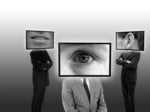How to protect your privacy in Windows 10

There has been some concern that Windows 10 gathers too much private information from users. Whether you think Microsoft’s operating system crosses the privacy line or just want to make sure you safeguard as much of your personal life as possible, we’re here to help. Here’s how to protect your privacy in just a few minutes.
Note: This story has been updated for Windows 10 version 22H2. If you have an earlier release of Windows 10, some things may be different.
Turn off ad tracking
At the top of many people’s privacy concerns is what data is being gathered about them as they browse the web. That information creates a profile of a person’s interests that is used by a variety of companies to target ads.





